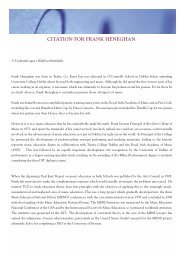TWICE THE SIZE - DIT Update - Dublin Institute of Technology
TWICE THE SIZE - DIT Update - Dublin Institute of Technology
TWICE THE SIZE - DIT Update - Dublin Institute of Technology
You also want an ePaper? Increase the reach of your titles
YUMPU automatically turns print PDFs into web optimized ePapers that Google loves.
SOCIETAL CHANGE<br />
A tidal wave <strong>of</strong> cultural modernisation is washing around the world where the basic tenets for<br />
current cultures -– including equality, personal freedom and self-fulfilment –- have been eroding<br />
the domains <strong>of</strong> traditional societies that value authority, filial obedience and self-discipline.<br />
Most people in the West regard the basic institutions <strong>of</strong> modernisation, such as universal<br />
education, meritocracy and civil law, as benchmarks <strong>of</strong> social progress, while the defenders <strong>of</strong><br />
more traditional cultures see them as serious threats to social order. This clash <strong>of</strong> cultures<br />
could provoke widespread political unrest, psychological stress and social tension. Alongside<br />
this, there is a general sense <strong>of</strong> the world getting smaller, and a growing awareness <strong>of</strong> the<br />
interconnectivity <strong>of</strong> issues, events and peoples. This had led to a complementary set <strong>of</strong> value<br />
changes which are contributing significantly to transformations in society.<br />
Global Context<br />
The ten most meaningful global societal trend drivers and issues have been identified as<br />
follows.<br />
1. Twin forces – homogeneity and diversity – are at play in transforming society into<br />
something new and unexpected. On the face <strong>of</strong> it contradictory, but in fact<br />
mutually supportive, the first leading to an awareness <strong>of</strong> the second. Overall,<br />
however, there will be a growing acceptance <strong>of</strong> cultural diversity, subject to local<br />
interruptions and regular reversals.<br />
2. As is being witnessed, the greatest threat to future world order and peace is the<br />
potential clash <strong>of</strong> civilisations or societal groups, not <strong>of</strong> countries, with prospective<br />
flashpoints lying not along national boundaries, but where different civilisations or<br />
communities meet. It can be said that ‘tribalism’ is fast becoming the most<br />
powerful force in the world.<br />
3. The 21 st century will see the culture <strong>of</strong> universal education for all people,<br />
worldwide, and throughout their lives. Education and learning will be available<br />
anywhere, anytime, for almost anyone, raising levels <strong>of</strong> literacy and skills, but also<br />
raising aspirations and expectations.<br />
4. A new business culture is emerging – one that is based as much on principle-centred<br />
leadership as it is on the pure pr<strong>of</strong>it motive. But the craze <strong>of</strong> ‘consumerism’ will<br />
continue, impelled by an ever more integrated global economy, but inspiring social<br />
unrest in quarters where small producers and retailers have a strong political<br />
present.<br />
5. Perceptions, attitudes and allegiances will increasingly be shaped by the global<br />
communications, media and entertainment industries. Youth worldwide, as a<br />
result, will place ever greater importance on economic success, and find it difficult<br />
to cope with cyclical downturns.<br />
6. There is a changing culture <strong>of</strong> healthcare stemming from such issues as new medical<br />
discoveries, alternative or complementary treatments, the duties and rights <strong>of</strong><br />
patients, and the roles and responsibilities <strong>of</strong> providers.<br />
91








